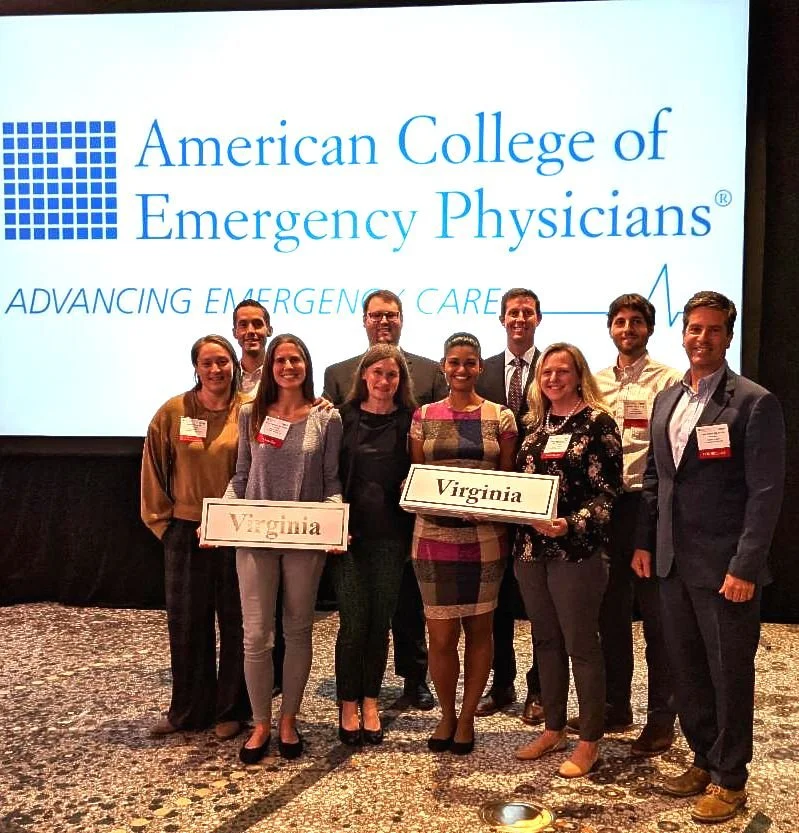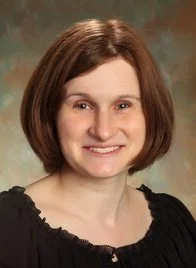How decisions in San Francisco last week will impact your emergency medicine practice in Virginia tomorrow.
VACEP Councillors attend ACEP Council meeting to set standards of care and EM policies
Caroline Cox, MD, made a quick trip out West last week.
The Virginia emergency physicians at ACEP Council in San Francisco this week (L-R): Jessica Maerz, Jesse Spangler, Sarah Klemencic, Caroline Cox, James Humble, Joran Sequeira, Joe Mason, Trisha Anest, TJ Tzavaras, and Todd Parker. Photo by Sarah Marshall, VACEP Executive Director.
Cox, one of Virginia’s 10 ACEP Councillors, traveled from Roanoke to San Francisco, where within the span of 48 hours door-to-door she and others voted on a series of resolutions that were under consideration by the American College of Emergency Physicians in advance of the organization’s annual conference.
Resolutions focus on issues affecting the practice of emergency medicine, advocacy and regulatory topics, and amendments to things like the College bylaws or rules.
“These resolutions direct ACEP to where they need to send their resources and what their clinical policies will state,” Cox explains. “So if your hospital is looking to change something or looking for standards of care related to emergency medicine, they will often cite ACEP policy as voted on in these resolutions.”
For example, a resolution passed last week by emergency physicians from all 53 chartered chapters (50 states, Puerto Rico, D.C., and Government Services) stated that buprenorphine is an essential medicine that should be provided in an emergency department. “Resolutions help establish a standard of care and policies that the majority of emergency physicians agree upon,” Cox said.
Here are some of the highlights from last week’s Council meeting.
Reproductive Care
The hottest issue: Reproductive healthcare in the ED after the 2022 Supreme Court decision to overturn the precedent established by Roe v. Wade.
Cox, an emergency physician at Carilion Clinic in Roanoke.
Several resolutions were directed to reproductive care. “The ones that passed did a fantastic job getting them worded right so that they’re protecting patients, protecting physicians, and being clear on medical standards of care and supporting doctors if they get into sticky situations,” Cox said.
The discussion, she said, was highly clinical and respectful. “Everybody was really sensitive to the fact that many physicians, just like many in the public, may have personal opposition to abortion,” Cox said. “We wanted to be sensitive to that and support people's opinions. But more importantly, we wanted to protect emergency physicians when they're caring for patients and protect a patient's ability to get the best medical care.”
Where Business Meets Medicine
Other resolutions looked at the involvement of corporations and private equity in emergency medicine and the impact of the emergency physician’s autonomy and ability to provide the highest quality emergency care, protect patient safety, and maintain their own wellness.
Resolution No. 28, for example, covered billing and collections transparency. It advocates for establishing policies that require revenue-cycle management entities to provide emergency physicians with billing information on request. “We didn’t want doctors to have another unpaid obligation to check billing data, but wanted them to be able to access it if needed for contract and job negotiations,” Cox said.
Another resolution, No. 56, made clear a policy statement on the corporate practice of medicine. It incorporated a less-stringent version of a California policy that requires all medical practices be owned by physicians (among other prohibitions), which alarmed Councillors.
ACEP’s Virginia delegation at the Council meeting last week in San Francisco.
“It was non-sensical to the way medicine is done these days,” Cox said. So while Council approved a “clear and aggressive” policy statement against the corporate practice of medicine, the version adopts “concepts” from the California policies and “made sure it won’t cause problems for ER doctors,” she said.
Advanced Practice Providers (Scope of Practice for Nurse Practitioners and Physician Assistants)
Several resolutions looked at autonomy of NPs and PAs in emergency medicine settings. “ACEP passed a statement saying that the gold standard emergency department practice is to have an on-site emergency physician who is supervising NPs and PAs,” Cox said.
Due Process
Another resolution directed ACEP to create a method for members to report incidents of denial of due process. “It further protects patients from corporate practices that can be harmful to them and their patients,” Cox said.
Other notes
There was overwhelming support for a resolution that says ACEP backs supervised consumption facilities and safe injection sites as a proven method of reducing overdose deaths.
One resolution originally would have punished those who assault a healthcare worker, “but people objected to the word ‘punishment’ and wanted appropriate consequences or actions, because some of those people just need help,” Cox said.
Finally, Virginia’s ACEP Chapter submitted and helped pass a resolution honoring J. David Barry, MD, FACEP, who died on September 2. Barry served in the U.S. Army and retired as a Colonel after 25 years of service with multiple wartime deployments and was active in ACEP’s Government Services chapter. He once served as program director at Naval Center Portsmouth in Virginia and in addition to his emergency medicine training, had a fellowship in toxicology. “Dr. Barry touched the lives of countless individuals as an educator, physician, role model, mentor, colleague, pioneer, friend, and devoted husband and father,” the resolution read.
We will publish a full list of the resolutions and the approved language once available.





